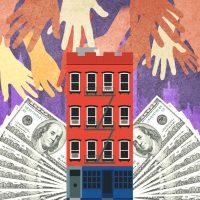Most New Yorkers support changing the city’s land-use policies to encourage housing construction, according to a new poll.
The survey, conducted by free-market think tank the Manhattan Institute, found that 59 percent of respondents strongly or somewhat support “loosening the city’s land-use regulations in order to allow the building of more housing,” while 24 percent oppose the idea. The poll of 1,485 New Yorkers was conducted in July.
Support for facilitating housing development was strong across the political spectrum. Of the 219 self-identified conservatives surveyed, 63 percent indicated that they favor such changes, compared with 58 percent of the 333 moderates and 59 percent of the 323 liberals.
Read more



Support among respondents in Manhattan, Brooklyn, Bronx and Queens hovered around 60 percent. In Staten Island, which had 55 participants, only 36 percent supported changes. Development is typically opposed on the island because residents do not want more vehicular traffic in the auto-dependent borough.
“I can’t read people’s minds and know precisely why Staten Island has such broad variation,” said Michael Hendrix, director of state and local policy at the Manhattan Institute. “Nevertheless, it is remarkable.”
The survey doesn’t specify a type of policy change, and repeats a sentiment often reflected in housing debates: People support more housing in the abstract, but oppose it in their backyards, fearing development will change the character of their neighborhoods.
Moreover, although most New Yorkers will tell pollsters they favor development, they are less likely than opponents to show up at hearings or pressure local elected officials when a project or rezoning is proposed.
Common objections to projects include that their heights, rents or sale prices will be too high, and that they will trigger gentrification. Some believe adding housing causes rents to increase — a sentiment that defies economic theory and has caused Deputy Mayor Vicki Been to lament, “We have lost the narrative.”
The state has mulled lifting the city’s cap on residential floor-area ratio, which is 12, to encourage more density. But some advocates have argued that the city’s Uniform Land Use Review Procedure, or Ulurp, must first be reformed to ensure thorough investigation of the potential impact of a project.
The Citizens Budget Commission announced last month that it will study Ulurp in-depth in light of the fight over the Industry City rezoning proposal. A central issue in that debate is the City Council’s tradition of voting along with the wishes of the local Council member on land-use issues. Sunset Park’s representative, Carlos Menchaca, opposes the rezoning of the 35-acre campus, while three of his colleagues have spoken in favor of it.
There have also been calls to analyze the racial impact of land-use decisions. In an op-ed in Gotham Gazette last week, Maulin Mehta, a senior associate of state programs and advocacy at Regional Plan Association, and Christopher Walters, rezoning technical assistance coordinator at Association for Neighborhood and Housing Development, wrote that city agencies need to move beyond a “color-blind approach to planning.”
“It would mean moving away from an approach that sees adding units as the sole indicator of a successful housing policy, without taking into account displacement, community wealth building, or racial equity,” the letter reads. “It would mean supporting and approving community plans that address both local and citywide goals, and learning to build trust in that process.”
But the Department of City Planning has found some community plans to be too restrictive and counter to the de Blasio administration’s housing supply goals.
Write to Kathryn Brenzel at kathryn@therealdeal.com
